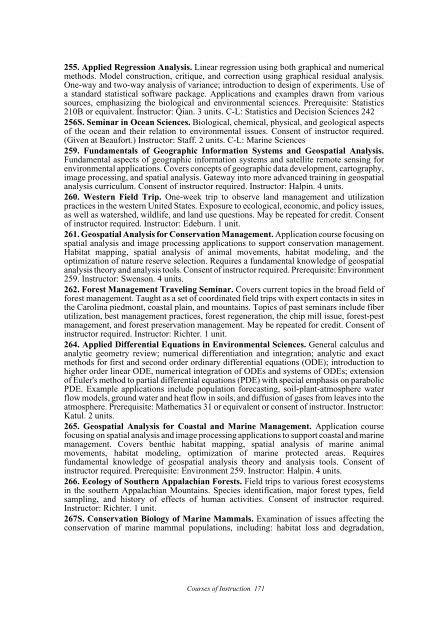Duke University 2008-2009 - Office of the Registrar - Duke University
Duke University 2008-2009 - Office of the Registrar - Duke University
Duke University 2008-2009 - Office of the Registrar - Duke University
Create successful ePaper yourself
Turn your PDF publications into a flip-book with our unique Google optimized e-Paper software.
255. Applied Regression Analysis. Linear regression using both graphical and numerical<br />
methods. Model construction, critique, and correction using graphical residual analysis.<br />
One-way and two-way analysis <strong>of</strong> variance; introduction to design <strong>of</strong> experiments. Use <strong>of</strong><br />
a standard statistical s<strong>of</strong>tware package. Applications and examples drawn from various<br />
sources, emphasizing <strong>the</strong> biological and environmental sciences. Prerequisite: Statistics<br />
210B or equivalent. Instructor: Qian. 3 units. C-L: Statistics and Decision Sciences 242<br />
256S. Seminar in Ocean Sciences. Biological, chemical, physical, and geological aspects<br />
<strong>of</strong> <strong>the</strong> ocean and <strong>the</strong>ir relation to environmental issues. Consent <strong>of</strong> instructor required.<br />
(Given at Beaufort.) Instructor: Staff. 2 units. C-L: Marine Sciences<br />
259. Fundamentals <strong>of</strong> Geographic Information Systems and Geospatial Analysis.<br />
Fundamental aspects <strong>of</strong> geographic information systems and satellite remote sensing for<br />
environmental applications. Covers concepts <strong>of</strong> geographic data development, cartography,<br />
image processing, and spatial analysis. Gateway into more advanced training in geospatial<br />
analysis curriculum. Consent <strong>of</strong> instructor required. Instructor: Halpin. 4 units.<br />
260. Western Field Trip. One-week trip to observe land management and utilization<br />
practices in <strong>the</strong> western United States. Exposure to ecological, economic, and policy issues,<br />
as well as watershed, wildlife, and land use questions. May be repeated for credit. Consent<br />
<strong>of</strong> instructor required. Instructor: Edeburn. 1 unit.<br />
261. Geospatial Analysis for Conservation Management. Application course focusing on<br />
spatial analysis and image processing applications to support conservation management.<br />
Habitat mapping, spatial analysis <strong>of</strong> animal movements, habitat modeling, and <strong>the</strong><br />
optimization <strong>of</strong> nature reserve selection. Requires a fundamental knowledge <strong>of</strong> geospatial<br />
analysis <strong>the</strong>ory and analysis tools. Consent <strong>of</strong> instructor required. Prerequisite: Environment<br />
259. Instructor: Swenson. 4 units.<br />
262. Forest Management Traveling Seminar. Covers current topics in <strong>the</strong> broad field <strong>of</strong><br />
forest management. Taught as a set <strong>of</strong> coordinated field trips with expert contacts in sites in<br />
<strong>the</strong> Carolina piedmont, coastal plain, and mountains. Topics <strong>of</strong> past seminars include fiber<br />
utilization, best management practices, forest regeneration, <strong>the</strong> chip mill issue, forest-pest<br />
management, and forest preservation management. May be repeated for credit. Consent <strong>of</strong><br />
instructor required. Instructor: Richter. 1 unit.<br />
264. Applied Differential Equations in Environmental Sciences. General calculus and<br />
analytic geometry review; numerical differentiation and integration; analytic and exact<br />
methods for first and second order ordinary differential equations (ODE); introduction to<br />
higher order linear ODE, numerical integration <strong>of</strong> ODEs and systems <strong>of</strong> ODEs; extension<br />
<strong>of</strong> Euler's method to partial differential equations (PDE) with special emphasis on parabolic<br />
PDE. Example applications include population forecasting, soil-plant-atmosphere water<br />
flow models, ground water and heat flow in soils, and diffusion <strong>of</strong> gases from leaves into <strong>the</strong><br />
atmosphere. Prerequisite: Ma<strong>the</strong>matics 31 or equivalent or consent <strong>of</strong> instructor. Instructor:<br />
Katul. 2 units.<br />
265. Geospatial Analysis for Coastal and Marine Management. Application course<br />
focusing on spatial analysis and image processing applications to support coastal and marine<br />
management. Covers benthic habitat mapping, spatial analysis <strong>of</strong> marine animal<br />
movements, habitat modeling, optimization <strong>of</strong> marine protected areas. Requires<br />
fundamental knowledge <strong>of</strong> geospatial analysis <strong>the</strong>ory and analysis tools. Consent <strong>of</strong><br />
instructor required. Prerequisite: Environment 259. Instructor: Halpin. 4 units.<br />
266. Ecology <strong>of</strong> Sou<strong>the</strong>rn Appalachian Forests. Field trips to various forest ecosystems<br />
in <strong>the</strong> sou<strong>the</strong>rn Appalachian Mountains. Species identification, major forest types, field<br />
sampling, and history <strong>of</strong> effects <strong>of</strong> human activities. Consent <strong>of</strong> instructor required.<br />
Instructor: Richter. 1 unit.<br />
267S. Conservation Biology <strong>of</strong> Marine Mammals. Examination <strong>of</strong> issues affecting <strong>the</strong><br />
conservation <strong>of</strong> marine mammal populations, including: habitat loss and degradation,<br />
Courses <strong>of</strong> Instruction 171









